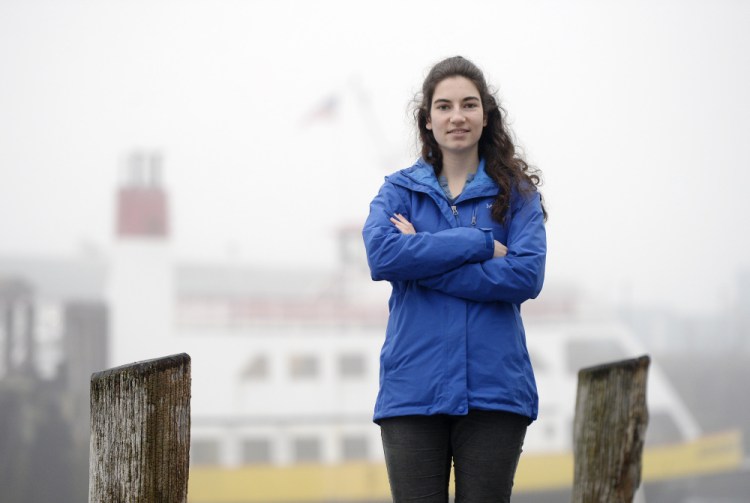Julia Maine and her mother, Carol White, a geologist, recently received a grant from the Casco Bay Estuary Partnership to hold a Chebeague Island Aquaculture Festival, the first-ever such event to be held on the Casco Bay island. The one-day festival, tentatively scheduled for July, is primarily intended to educate community members about the aquaculture farms that are already there, but Maine has a few other ideas about ways it might prove useful.
We talked to the recent college graduate about the allure of aquaculture and the opportunities it offers.
FIRST GENERATION: Maine grew up on Chebeague with her mother, her father (who plays bass in the Novel Jazz Septet in his free time), her sister and a lot of outdoor time. “Our parents forced us to.” Almost apologetically, the way people do, she says, “I am not one of the fifth-generation islanders.” But she is native. “It’s the only place I’ve ever lived except for college.” (She graduated from Bowdoin College last May.) Last summer, Maine had an internship through the Island Institute at the Chebeague Island Oyster Co., one of the island’s newer aquaculture businesses. She worked with owners Bob Earnest and David Whiston, who started the business about three years ago, as well as Caitlin Gerber. “She is sort of the science brain.”
GRUNT WORK: Her farm chores included handling the spat (young bivalves) as they go into and grow in an upweller, a tank system that both protects the spat and allows continuous flowing water (and plankton) to circulate around the spat and feed them. “They look like a bag of rice” when they go in the upweller, but by the end of the summer, when they’re transferred to bags, ideally “they’re the size of a quarter.” The bags are “planted” in the ocean farm, where they grow to market size. (The Chebeague Island oysters made it onto the menu at Scales in Portland last September.)
FARM TO FESTIVAL? Did the summer job inspire her to throw aquaculture a party? That and some other factors. Maine studied earth and oceanographic science at Bowdoin. Her senior honors project was about oysters, specifically the effect of ocean acidification on the shellfish. Her mother does a lot of work around water quality, and since aquaculture is relatively new to Chebeague (with the exception of nearby Bangs Island Mussels, which has been in business since 1999), Maine sees an opportunity to educate her fellow islanders about it and about why water quality is so important to these endeavors. “We want to encourage people to take care of their water quality, even what’s coming from their wells or what is coming off their land that might end up in the ocean. Because it has such an impact on what is coming off these farms.”
WHAT’S THAT? Maine also thinks a festival would be a way to satisfy curiosity on the island. There are the looky-loos: “People would always come down when they saw me working on the upweller and ask about it.” Then there are the potential sea farmers who might be just waiting for a summer festival to spark a new plan. “I think a lot of the lobstermen are sort of thinking about that as another path even.” Maine said they’ll ask Bangs Island and Ocean Approved, which has a kelp farm not that far from Chebeague, to participate, as well as Chebeague Island Oyster Co., an experimental clam farm that Manomet established last year and another fledgling oyster farmer who is already a successful lobsterman. “Basically, we want to get that connection between the residents and the aquaculture farmers.”
DAY JOB: As for Maine, she’s living off-island at this point, on Munjoy Hill, and enjoying both city life and her first post-college job at the Gulf of Maine Research Institute, where she helps run a program for fifth- and sixth-graders from around the state. Is she planning to make a career of this? She said she devotes a lot of “brain time” to trying to figure out her future. “What direction do I want to go? I really like the education stuff that I have gotten to do at GMRI.” And she’s also enjoyed all that she’s learned about how oysters develop. “But when it comes down to it, at the end of the day, I really just want to do science.” In the future, she could imagine teaming up with her mother to open an aquaculture consulting business, one where the wannabe farmer would hire them to figure out the best location to start growing. That plan, though, is in the nascent stage, and in the meantime, she’s got a festival to plan. Will there be food? “Hopefully,” she said. The grant is for $950, so at this point, mussels for all are not in the budget. But stay tuned.
Mary Pols can be contacted at 791-6456 or at:
Twitter: MaryPols
Send questions/comments to the editors.



